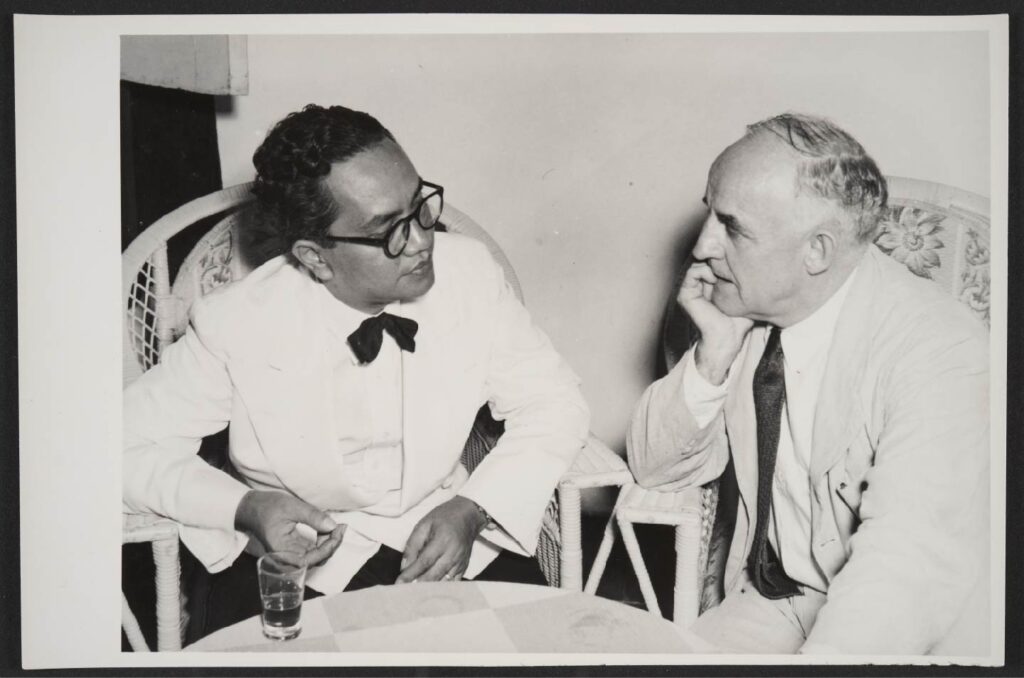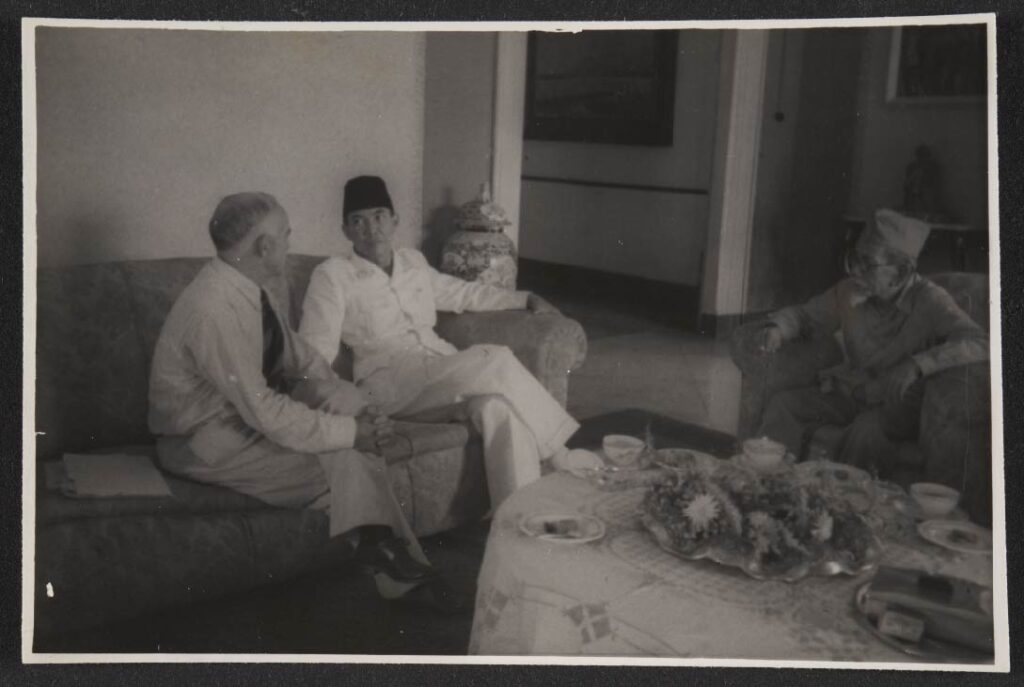Dr. Frank Meeting the Indonesian People
This page is the fifth of nine in a virtual exhibition on Frank Porter Graham’s role in negotiations for the recognition of Indonesian independence. See the homepage for the exhibition here. See the previous page here. See the next page here.
Even before his departure to Indonesia, Dr. Frank was meeting with Indonesian leaders to hear their side of the story. On October 15, 1947, he sat down in New York with two Indonesians representing the country at the United Nations, Mr. L.N. Palar and Dr. Soemitro Djojohadikusumo.[1]
Upon landing in Indonesia, meetings were mostly with the leaders of the Republic of Indonesia and with the chief negotiators from the Republic’s diplomatic team. The Indonesian delegation to negotiations was led by Prime Minister Amir Sjarifuddin, with vice-chair Dr. Leimena.[2] Memoranda sent by the US Consul General at Batavia back to the US Department of State report Dr. Frank was repeatedly meeting with Indonesian leaders of almost every political stripe, including President Sukarno, Setiadjit of the Labor Party, and leaders of the Islamic party Masjumi.[3]

Dr. Sukiman, the chairman of Masjumi, gave a radio speech on January 5, 1948, in which he said
All the members of the Commission of Good Offices, without exception, and especially Prof. Dr. Frank Graham, as I know by personal contact, watching and working hard for the prestige of the Security Council, are men of great vision, friends of humanity and of remarkably keen understanding of the problems of the day in Indonesia. I admire the high ranking ideals and knowledge of Dr. Graham of the history of mankind.[4]
The Indonesian leaders, especially Vice-President Mohammad Hatta and the Prime Minister Amir Sjarifuddin, were very encouraged when Dr. Graham told them in private negotiations “You are what you are.” They took this as a tacit recognition by the US negotiator that Indonesia already had a legitimate government, diplomatic relations, and the support of the people to become independent.[5] Another thing that undoubtedly helped his relations with the Indonesian side was the backing of the US government, separate from the auspices of the UN. Dr. Frank was authorized by the Truman administration to promise “substantial American aid for the rehabilitation of a free Indonesia.”[6]

Of course, there were also Indonesians who supported the Dutch in creating a federal state and extending Dutch imperial authority over the archipelago, and Dr. Frank met with them, too. On November 16, 1947, he met Raden Abdulkadir Widjojoatmodjo—a famous civil servant in the Dutch colonial administration and lead negotiator on the Dutch side—and his wife for lunch, and described him this way in a letter home:
The Dutch consider him quite a hero. The Indonesians consider him the number one quisling. A good officer must now reserve his judgment.[7]
There were also opportunities for Dr. Frank to hear from non-elite Indonesians, outside the government. When in Batavia, Dr. Frank received a notebook from the local Chinese community, detailing specific “Acts of Violence and Inhumanity Perpetrated by Indonesian Bands against Innocent and Defenceless Chinese” [sic].[8] As the Dutch were setting up a separate state of Pasundan in West Java in December 1947, Dr. Frank met with a collection of concerned citizens of West Java who did not want to be separated from the Republic of Indonesia.[9]
Communication with Indonesian leaders also continued after Dr. Frank had left his position with the Committee of Good Offices and returned to the United States. Soedarpo Sastrosatomo, an Indonesian diplomat and public relations official stationed at the United Nations in New York, wrote Dr. Frank a letter in March 1949 hailing imminent independence, saying
It’s 1776 in Indonesia.[10]
[1] “Notes of Conversation between Dr. Graham and Indonesian Representatives in New York on October 14, 1947,” in the Frank Porter Graham Papers, Wilson Library, UNC-Chapel Hill, folder 1983.
[2] Ide Anak Agung Gde Agung, Twenty Years Indonesian Foreign Policy, 1945-1965 (The Hague: Moulton, 1973), 37.
[3] E.g., “Consul General at Batavia (Livengood) to the Secretary of State,” December 30, 1947, 501.BC Indonesia/12-3047: Telegram,” Foreign Relations of the United States, 1947, The Far East, Volume VI.
[4] “Radio Speech of Dr. Sukiman, Chairman of the Board of the Moslem Political Party MASJUMI,” in the Frank Porter Graham Papers, Wilson Library, UNC-Chapel Hill, folder 2091.
[5] Agung, 39.
[6] Agung, 39.
[7] Letter from Frank Porter Graham to Marion Graham, November 16, 1947, in the Frank Porter Graham Papers, Wilson Library, UNC-Chapel Hill, folder 1982.
[8] “Documentary Reports Pertaining to Acts of Violence and Inhumanity Perpetrated by Indonesian Bands against Innocent and Defenceless Chinese,” in the Frank Porter Graham Papers, Wilson Library, UNC-Chapel Hill, folder 1980.
[9] Letter from Dr. R. Tumenggung Djumhana Wiriaatmadja to Frank Porter Graham, December 21, 1947, in the Frank Porter Graham Papers, Wilson Library, UNC-Chapel Hill, folder 1983.
[10] Letter from Soedarpo to Frank Porter Graham, in the Frank Porter Graham Papers, Wilson Library, UNC-Chapel Hill, folder 2156b.
Further Reading:
For primary documents connected to the negotiations at this time, the Frank Porter Graham Papers at UNC’s Wilson Library has some interesting materials, but many more memos and cables have been collected in the State Department’s Foreign Relations of the United States, 1947, The Far East, volume VI.
For more on the atrocities faced by the ethnic Chinese community in Indonesia during the revolution, connected with the dossier provided to Dr. Frank and now stored in his papers, see Mary Somers Heidhues, “Anti-Chinese Violence in Java during the Indonesian Revolution, 1945-49.” A diplomatic wife based in New York has written about the Indonesian leaders in the mission to the UN, who first contacted Dr. Frank; see Mien Soedarpo, Reminiscences of the Past. (It was also Mien’s husband, Mr. Soedarpo, who wrote Dr. Frank in 1949 with the well-chosen phrase “It’s 1776 in Indonesia.”)
